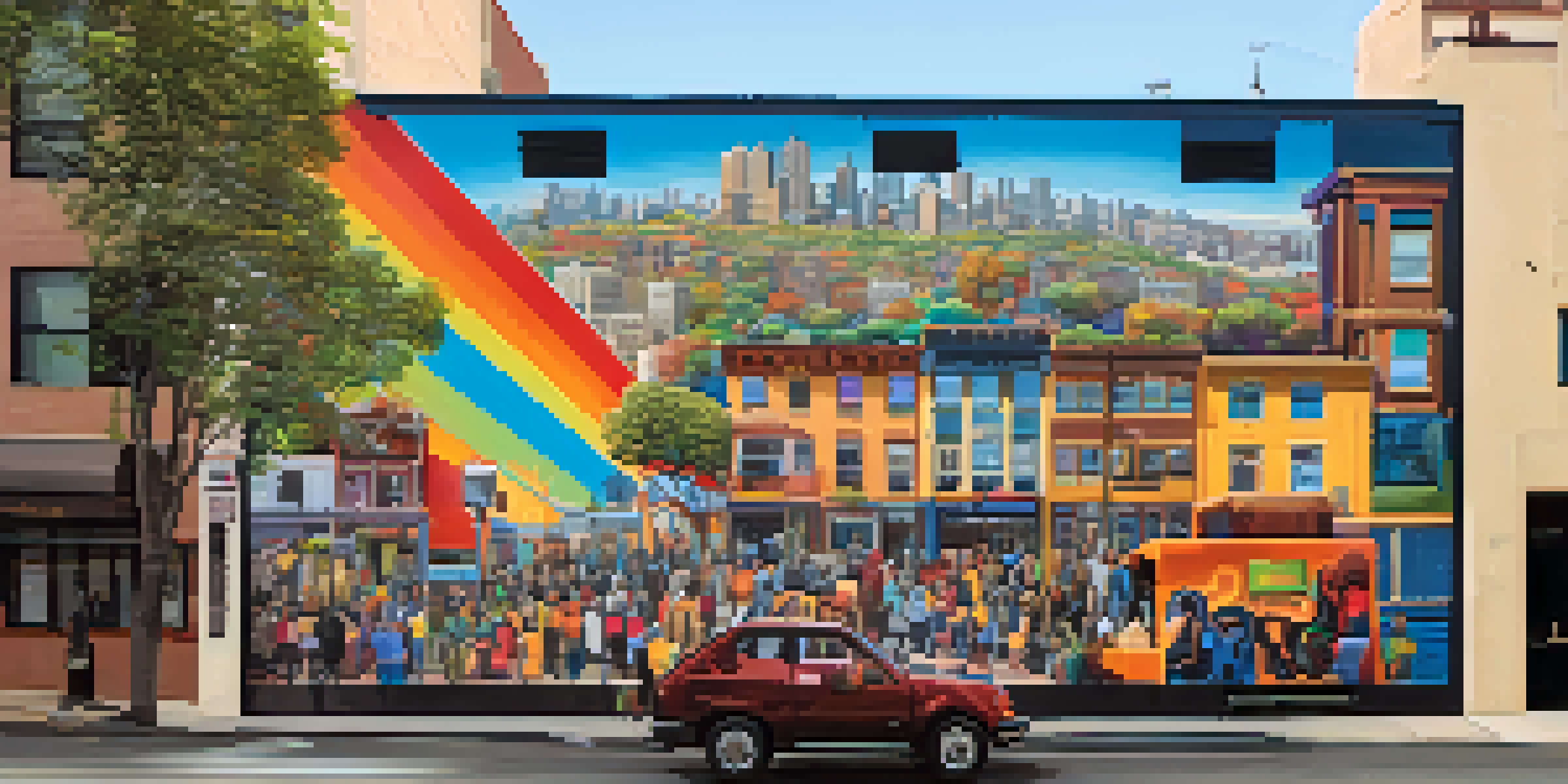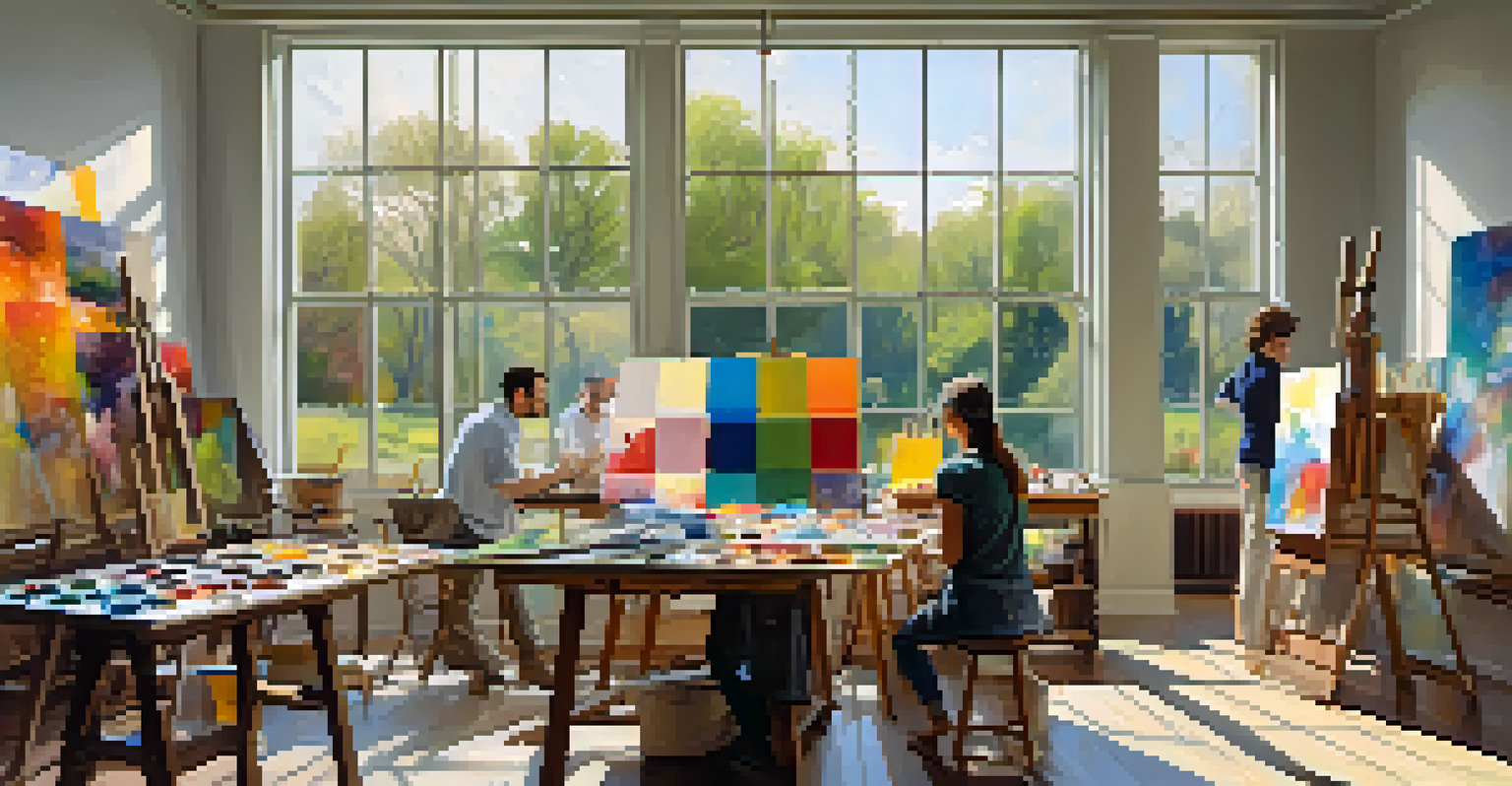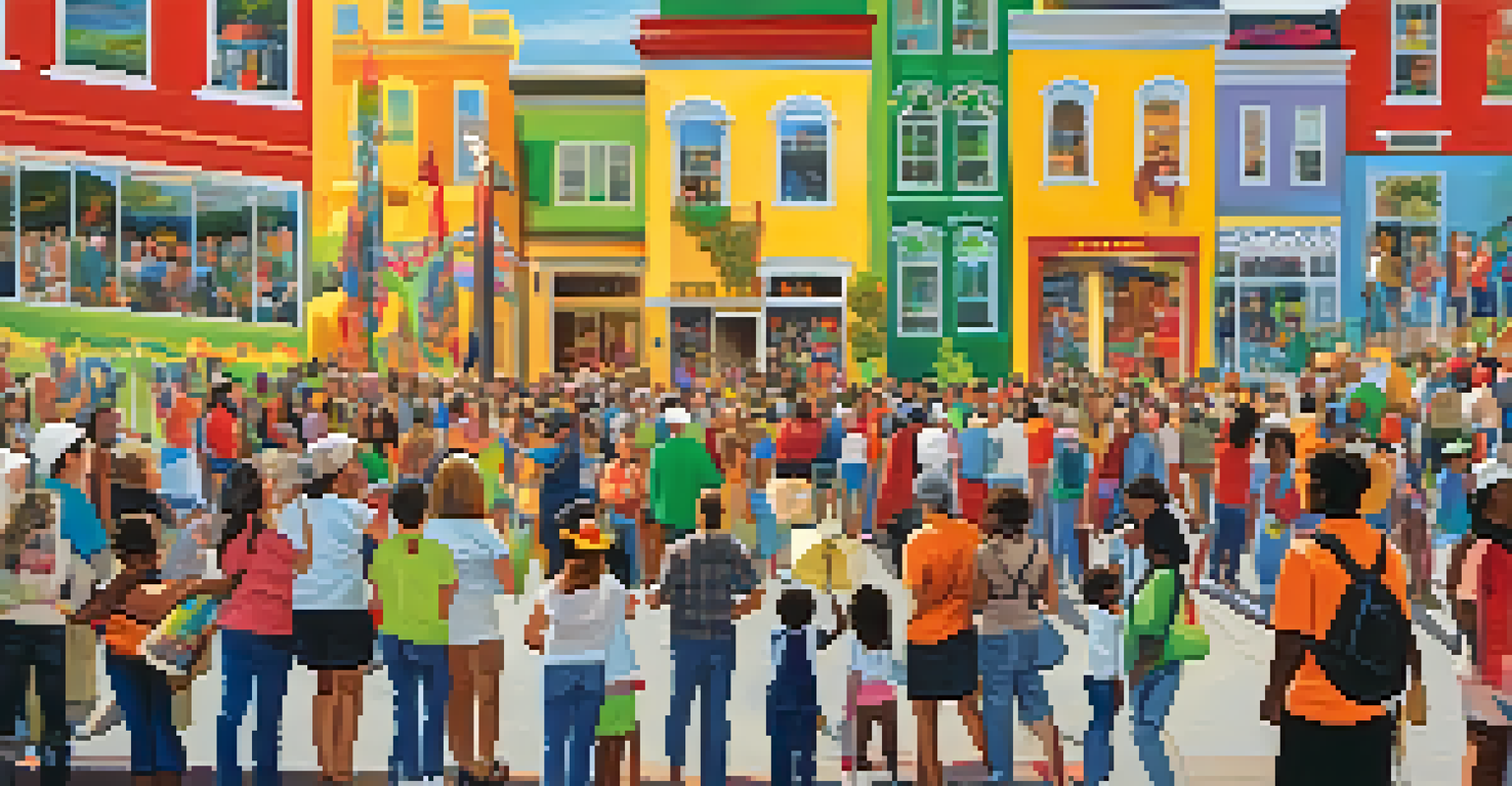How Teamwork Among Artists Transforms Traditional Painting

The Evolution of Traditional Painting Through Collaboration
Traditional painting has long been an individualistic pursuit, where artists express their unique visions on canvas. However, the landscape is shifting as collaboration becomes a vital part of the creative process. This evolution allows artists to blend their diverse styles, techniques, and ideas, resulting in artwork that often transcends what any single artist could achieve.
Creativity is thinking up new things. Innovation is doing new things.
For instance, a project may involve a landscape painter teaming up with a portrait artist, merging their skills to create a vibrant scene filled with life and emotion. Such collaborations not only enhance the final piece but also enrich the artists' individual practices, pushing them to explore new avenues of creativity. This synergy highlights how teamwork can breathe new life into traditional forms of art.
As artists share their perspectives and techniques, the learning curve steepens, fostering a community where innovation thrives. Ultimately, this collaborative spirit helps to redefine traditional painting, making it a more inclusive and dynamic practice.
Breaking Down Creative Barriers Through Teamwork
Teamwork among artists can dismantle the barriers that often hinder creativity. When artists collaborate, they challenge each other's perceptions and push boundaries that might have gone untested in solitary work. This collective exploration encourages risk-taking, allowing artists to experiment with new materials, styles, and concepts that can lead to groundbreaking results.

Take, for example, a group of street artists who come together to create a mural. Each artist brings their unique flair, resulting in a piece that reflects a fusion of urban culture, personal stories, and artistic techniques. This collaboration not only produces a vibrant artwork but also invites viewers to engage with the diverse narratives being represented.
Collaborative Art Enhances Creativity
Teamwork among artists fosters innovation by merging diverse styles and techniques, resulting in richer artwork.
By breaking away from the constraints of individualism, artists can tap into a wellspring of creativity that might otherwise remain dormant. This camaraderie fosters an environment where innovation flourishes, ultimately transforming traditional painting into a more vibrant and varied art form.
The Role of Technology in Collaborative Artistic Practices
In today's digital age, technology plays a pivotal role in facilitating collaboration among artists. Online platforms and social media allow artists from different backgrounds and locations to connect, share ideas, and work on projects together, regardless of physical distance. This accessibility opens up a world of possibilities for creating art that reflects a multitude of voices and experiences.
Individually, we are one drop. Together, we are an ocean.
For instance, a group of artists can collaborate on a digital painting, each contributing their own section from different parts of the world. The final piece showcases a blend of styles and techniques, illustrating how technology has expanded the traditional notion of painting. This kind of teamwork not only enhances the artwork but also strengthens the global art community.
As artists continue to harness technology, they can experiment with new formats, such as augmented reality or interactive installations, further pushing the boundaries of traditional painting. This integration of technology not only enriches the artistic process but also invites audiences to engage with art in innovative ways.
Community Engagement: Art as a Collective Experience
Art has the power to bring people together, and collaborative projects often foster a sense of community. When artists work together, they can engage with local communities, inviting them to participate in the creative process. This collaborative spirit not only enhances the artwork but also strengthens the bond between artists and the community.
Consider a local art initiative where artists collaborate with community members to create a mural that reflects their shared history and aspirations. This process not only results in a stunning piece of art but also empowers residents to take ownership of their environment. Such projects highlight the importance of collaboration in making art a shared experience.
Technology Expands Artistic Collaboration
Digital platforms allow artists from different backgrounds to connect and create together, broadening the scope of traditional painting.
By involving the community in the creative process, artists can tap into a wealth of ideas and perspectives that enrich their work. This collective approach transforms traditional painting into a vibrant tapestry of voices, making art more relevant and resonant in today's society.
The Impact of Collaborative Art on Audience Perception
When audiences encounter collaborative art, they often experience a sense of connection and inclusivity. This type of artwork can resonate on a deeper level, as it embodies the diverse voices and stories of the artists involved. The collective nature of the piece invites viewers to engage with the artwork in a more personal and meaningful way.
For example, a collaborative exhibition featuring multiple artists can provide a richer narrative experience, as each piece adds a layer of meaning to the overall theme. This multifaceted approach encourages audiences to explore the interplay between different artistic expressions and perspectives, fostering a deeper appreciation for the art form.
As audiences become more aware of the collaborative process behind the artwork, they may also feel inspired to engage in their own creative endeavors. This ripple effect showcases how teamwork among artists not only transforms traditional painting but also enriches the cultural landscape for everyone involved.
Inspiring Future Generations Through Teamwork in Art
The collaborative spirit in art has the potential to inspire future generations of artists. As young creators witness the power of teamwork, they learn the value of community, shared knowledge, and collective creativity. This early exposure can shape their artistic journeys, encouraging them to explore collaboration as an integral part of their practice.
Educational programs that emphasize collaborative art projects can provide students with hands-on experience working alongside established artists. These opportunities foster mentorship and skill-sharing, equipping the next generation with the tools they need to thrive in a collaborative art world. Such initiatives can ignite a passion for creativity and cooperation that lasts a lifetime.
Community Engagement Enriches Art
Involving local communities in collaborative art projects strengthens bonds and makes art more relevant to societal narratives.
By nurturing a culture of collaboration, we can ensure that traditional painting continues to evolve and adapt to the changing landscape of art. Future artists will carry forward the legacy of teamwork, infusing their work with fresh perspectives and innovative approaches.
Conclusion: Embracing Teamwork for Artistic Growth
In conclusion, teamwork among artists is transforming traditional painting in profound ways. By breaking down barriers, leveraging technology, and engaging communities, collaborative efforts enrich the artistic landscape. This shift not only enhances the final artwork but also fosters a sense of belonging and shared purpose within the art community.
As we embrace this collaborative spirit, we open ourselves to new ideas, techniques, and perspectives that can elevate our artistic practices. The fusion of diverse voices creates a richer tapestry of creativity, allowing traditional painting to flourish in today's world.

Ultimately, the power of teamwork in art reminds us that creativity thrives in community. As artists continue to collaborate, they pave the way for innovative expressions that inspire audiences and future generations alike.